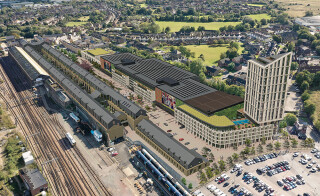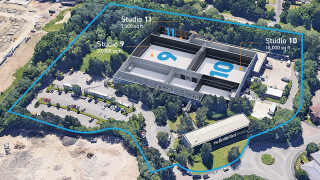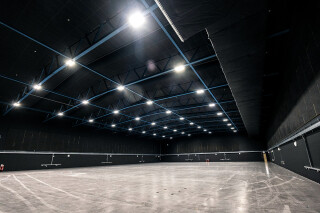There might be a famous ‘Hollywood’ sign, but a ‘Hertfordshire’ one?
Perhaps. For there are well over £1bn-worth of film and television studios either being built, in preparation or seeking planning consent in an arc around London from Berkshire to Ashford.
Contractors are of course happy with this deluge of work for a relatively new commercial sector but some may be puzzled, both by why this investment is happening at all and why it is happening around London rather than in California.
The answers concern the growing popularity of streaming services, London’s large film industry skills base and the relative costs of shooting here or in the US.
Whichever of these factors really drive the investment, this looks like a long pipeline of construction work. Take for example Sunset Studios at Waltham Cross, a project understood to be worth £700m.
ISG has been appointed to develop the 90-acre site by investment funds Blackstone and Hudson Pacific Properties, which own Sunset Studios. This will be Sunset’s first site outside the US and will comprise 21 sound stages, nine workshops and numerous other buildings.


ISG is planning to use ‘modern methods of construction’ and the studio is designed to generate much of its energy through a large photovoltaic installation.
So, what is it like to build a studio rather than, say, a large distribution centre or factory?
Paul Serkis, ISG’s project director, explains: “When you look at these film studio campuses, they basically bring together a number of different facets of what we deliver as a major contractor.
“If you take the sound stages and the workshops, they’re sort of really big warehouse type facilities that you then put steel gantries in so the film people can connect all of their equipment. You then move into the fit-out elements of what’s required.
“Particularly for the sound stages: if you consider you’ve got filming going on in there, they need absolute silence. So the acoustics are major components of our work and it’s not just like building a warehouse as you’ve got all that steel gantry so there’s a lot more technical specifications that are required.”

Serkis says ISG will work with design teams to arrive at the required decibel ratings depending on the type and size of the sound stage, which typically ranges from 20,000 to 60,000 square feet.
Acoustic issues must take account of the facades, roofing, and what will be on the roof. “If you’re putting photovoltaics on top, for example, you must make sure there isn’t going to be any noise,” says Serkis.
He says building a film or TV studio involves reconciling often conflicting requirements. “You might have precast upstands and then have the cladding wrapping around, but equally you need to have the right level of insulation and the right fire protection,” Serkis says.
“So the fire engineering solution together with the acoustic needs must meet all the requirements and be cost effective in terms of what’s being designed,”
Adrian Wooton, chief executive of Film London, an agency that promotes London as a major international television and film-making cultural centre, thinks the UK is nowhere near meeting the demand for studio space yet and expects many more projects even beyond those planned.
He says: “The reason they are coming here is that there has been almost a perfect storm of expansion in film – but particularly in TV with the rise of the streaming services such as Netflix, Amazon, Apple [as well as] from traditional studios like Paramount Plus and Disney Plus.
“The UK has a great base of skills among technical crews and we have a tax credit for
film production, which is very attractive. Then you have the ‘soft power’ of London and the English language so it has built up into something very attractive to studios.”

Television is the main driver because, while a film-maker will occupy sound stages for four to six weeks and then leave, television producers will make a whole series there. If the series is a hit, the production company will see it recommissioned and so will want to leave its sets on the sound stages, maybe for years at a time.
That means those stages are unavailable for other productions so there’s a need to build more space. “A television production – if it’s something really popular like Game of Thrones – might take over a studio for years and be there with only short breaks,” Wooton says.
He explains that some studios want to own and build real estate but others prefer just to take a long lease, which means investors have come forward who will pay to build a studio so long as a production company takes a lengthy lease.
Most of the money comes from America, says Wooton: “It’s still better value for them to come here than shoot in America, partly because of the tax credits and the scale of the facilities.
“You’d have to add together productions in the whole of North America to match the amount here,” he continues. “We estimate there is 3.5 million square feet of studio space in the UK and that there is demand for five million square feet. So we are well on the way with more to come.
“London and the southeast is the biggest market but there are also important film and TV centres in Wales, Scotland, Northern Ireland, Liverpool, Manchester, Yorkshire – and Bristol and Birmingham are coming up.”

Among the projects currently under way in the regions is Bottle Yard Studios, near Bristol, where ISG is building three new sound stages, bringing the total number to 11.
ISG was awarded the £12m contract by Bristol City Council to convert an industrial property at Hawkfield Business Park, less than half a mile from the main Bottle Yard site, into three new sound stages measuring 20,000, 16,000 and 7,000 square feet.
The filming spaces will be accompanied by ancillary spaces including production offices, prop stores, costume/makeup areas and breakout areas, amounting to approximately 82,000 square feet of converted floor space in total.
Wooton says there is constant industry speculation about whether demand might dry up as consumers become less keen on subscribing to streaming services. “Eventually you must hit a ceiling”, he says.
But director Barnaby Thompson, a partner in London’s famous Ealing Studios (which claims to be the world’s oldest film studio) has few misgivings. He says the new 14,000 square-foot stage and other renovations and additions that Ealing Studios has planned will go ahead because “building studios is driven by increased demand with the rise of streaming services.
However, he admits that “over-supply of studios might become an issue one day and if that did happen the ones further out from London might suffer since proximity to London and Heathrow is a big factor for studios.”.
Thompson says building sound stages “is a very definite skill and in the past some have been built that did not meet needs”.

He adds: “We are seeing issues that I guess are common across the construction industry of supply problems and Brexit having caused skill shortages.”
Meanwhile, Serkis looks ahead to the promise of a steady stream of studio-building opportunities that will allow ISG to recruit and retain the skilled labour needed.
“I think there’s quite a lot of opportunity here because of the different skill sets that are required,” he says. “There are six key trades: groundworks, piling, mechanical, electrical, steelwork and cladding; then you then reach fit-out. So there are enough different opportunities for quite an array of suppliers, and they know how we work and the standards that we expect.”
Serkis draws on his own family’s experience for his view of where this market is going. “My family is more into streaming; it’s very rarely that I watch scheduled television now and so people’s habits are changing with all the other sorts of providers and platforms, so they all need content to feed our demand to watch,” he says.
“The call for more studio space is greater than ever. There was £5bn spent on film and high-end television production in 2021 and the predictions are it’s going to rise to some £11bn by 2026 if it follows on the same trajectory.”
Hopefully the construction industry can expect Serkis – as well as film directors – to be shouting “action” rather than “cut” for some long time to come.
Got a story? Email news@theconstructionindex.co.uk



